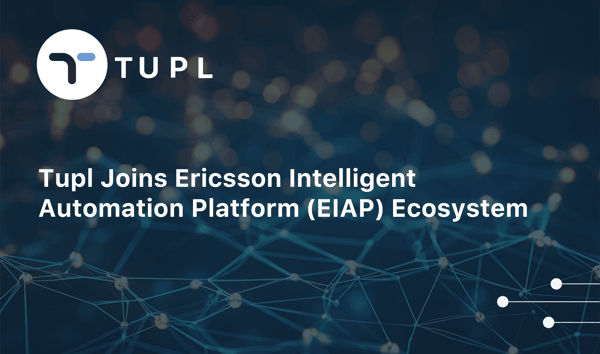
Tupl Showcases Visionary AI Quality Inspection at Advanced Factories Barcelona 2025
2025-03-24 · Press Releases

Operations and repeated routine actions are among the most arduous aspects of customer care in the telecommunications industry. Telecom operators need to excel at this task, and artificial intelligence (AI) has the potential to simplify it by optimizing various functions that make up operations.
Leading telecom operators are set up for success with AI solutions that help optimize in-store customer experience or call center operations, and they have already begun to deploy AI in their field of service operations.
Telco service operations volume is constantly increasing. Field and service operations account for 60 to 70 percent of most telcos' operating budgets, so applying AI can offer accurate and rapid benefits.
The industry has already faced increasing cost pressure, and the returns on necessary infrastructure investments are barely outpacing the costs of capital. At the same time, staffing telco operations functions has become increasingly arduous because of labor scarcity.
To stay ahead, operators must make critical investment decisions around customer and employee experience. At the same time, they need to offer efficient and effective processes to keep costs down while increasing the retention of both customers and employees.
Telcos are rethinking AI in their service operations, reducing customer support requests and the overall quantity of agents dedicated to customer support. So, leveraging AI Automation and changing the IT infrastructure is the only distinctive way to outperform and improve customer service quality.
In this article, we will show you how we are advancing telco customer service operations with Tupl's AI Care.
Across the telco customer life cycle, service quality is one of the most critical drivers of customer satisfaction or dissatisfaction. More importantly, it is directly impacted by the agility and effectiveness of underlying processes on the operator’s side. From a customer perspective, getting timely and effective assistance with service disruption issues is critical to remaining a subscriber and proceed trusting the brand.
Today, Telco operators still have their Customer Complaint Management processes as highly manual, time-consuming, not systematic, and not consistent. Operators are facing challenges in two major areas – a high volume of complaints and long cycles of complaints resolution.
1. High volume of complaints
A high volume of complaints causes a heavy workload for analysis, actions to be triggered, and tracking of results.
The number of customer-complaints for telcos are driven by the complexity of their products and services along with the processes underlying their customer journeys. Despite advances in technology, reducing complaints volume remains a serious challenge for telcos.
2. Long cycle time for complaints resolution
Telecom operators struggle to resolve customer complaints quickly. Technical complaints review takes time (>30 min. per ticket; sometimes – a couple of days), causing a delayed response to already unsatisfied customers; and what’s even worse: only 70 percent of cases can be solved (where 25-50% has a chance of not finding the root cause at all).
Information is processed on legacy, slow, malfunctioning & disjointed systems, and it requires more time from complaint filing to first response until the root cause is identified. As a result, customer satisfaction and NPS goes down, while the churn rate increases.
Picture 1: The example of manual technical Customer Complaint Management process
AI Care - is an AI Customer Support Automation solution that uses all relevant Network and Customer data to detect the root cause of the customer problem, troubleshoot it, and provide actionable recommendations using natural language to Customer Service agents, Network Operations & Engineers.
Tupl AI Care reduces the workload and increases the productivity of a customer service team at stores and call centers by reacting to and resolving customer issues within a couple of minutes or even during the first call, thus improving First Call Resolution Rate (FCR), which is one of the key KPIs Telcos look at.
The workflow of Tupl AI Care is depicted below.
Picture 2: Workflow of Tupl AI Care
Tupl AI Care has two different modes - reactive and proactive. In reactive mode, Tupl’s AI engine finds the problem and provides a solution immediately or in up to 90 minutes, while in proactive mode the AI engine monitors the subscriber's experience in near real-time to detect service-impacting issues, solve them or forward them to the engineering team for a final decision.
But, as technologies and customer service are constantly evolving, Tupl has presented the 3rd generation of the AI Care solution - AI Care NOW. With it, all customer-impacting issues are solved in just 3 minutes (and in some cases in 50 seconds) instead of 90 minutes per ticket on average.
First Call Resolution was improved by 5%, and Customer Ticket reduction by 78%. With AI Care NOW, we are officially over 2000x faster (from 2 days down to 1 minute) than the traditional way of resolving customer issues.
Picture 3: Infrastructure of AI Care and AI Care NOW
The main measurable impact of these automatic customer ticket resolution solutions can be summarized as follows:
- 4 x more accurate: reducing the number of Customer Complaints closed as “No Trouble Found” or “Not Enough Info”
- 100 x faster response to the customer: providing the root-cause in minutes vs 45+ hours
- 90% of complaints resolved automatically in closed-loop operation and with a reduction of engineering time in at least 50% of the remaining cases
- 100% consistency: reducing dependence on the different experience and skillset of various engineers
The Virtual (Proactive) customer complaint system creates tickets for customers experiencing problems, monitors virtual tickets, acts if there is an issue, or continues to monitor the customer’s experience.
The impact is measured in:
- Churn prevention: catching these churn-risks and taking appropriate actions in advance, potentially creating enormous value.
- Fewer customer care calls: significant reduction as they are solved prior to complaints (50% of customer tickets are automatically fixed in a close loop).
- Customer Care time savings: increase first call resolutions in customer care and decrease mean holding time.
- Improved efficiency and prioritization of engineering tasks.
The 3rd generation of the AI Care solution (“ticket avoidance”) is measured in a dramatic reduction in workload for support engineers and improved customer satisfaction and, consequently, of NPS level. In the data, the impact is measured in:
- 5% in First Call Resolution – up to 50 seconds instead of hours results in better customer satisfaction and NPS, thus reducing operational costs.
- 78% Ticket reduction – drastically reduces operational costs for your level 2 customer support team since many tickets are contained within level 1.
- +10% Device upselling due to better FCR, cross and upselling interactions are more likely to happen.
Picture 4: Without Tupl AI Care vs with Tupl AI Care solution.
AI applications have become widespread in customer services, significantly improving customer service experience and reducing reliance on humans.
We have built more than 900 ML models (due to 900 potential root causes) and grouped them in the below structure of macro use cases. Tupl AI Care, as a customer care solution, can detect and resolve Location specific, Provisioning, Service Configuration, and Device problem service impacting issues with 90% of algorithm accuracy.
Picture 5: AI Care use cases
Videos of AI Care Use Cases and how Tupl can help to resolve a particular issue are represented on our YouTube channel or website.
All three generations of AI Care solution, as all Tupl automation products are built on TuplOS ML operations engine - a SaaS platform for Big Data utilities to facilitate the automation of any business process.
TuplOS simplifies the integration of multiple data sources, captures expert process knowledge using artificial intelligence and machine learning utilities, and offers unified analytics for advanced data analysis and reporting.
Learn more about TuplOS on our website.
Although telco operators continue facing intimidating headwinds, artificial intelligence can help mitigate them by optimizing service operations. The universality of technology and the growing application of AI and ML enable a new wave of growth and disruption. Telcos that take this opportunity to continue to innovate on this path are more likely to emerge as the undisputed leaders in the long run.
NOW - is the perfect time for AI automation. Book a demo with Tupl and we will provide you more details about our applied experience in your particular industry.

2025-03-24 · Press Releases

2025-03-18 · Press Releases · Articles · Product · Others

2025-02-25 · Press Releases
Get started and request a demo to learn how our solutions can help you.